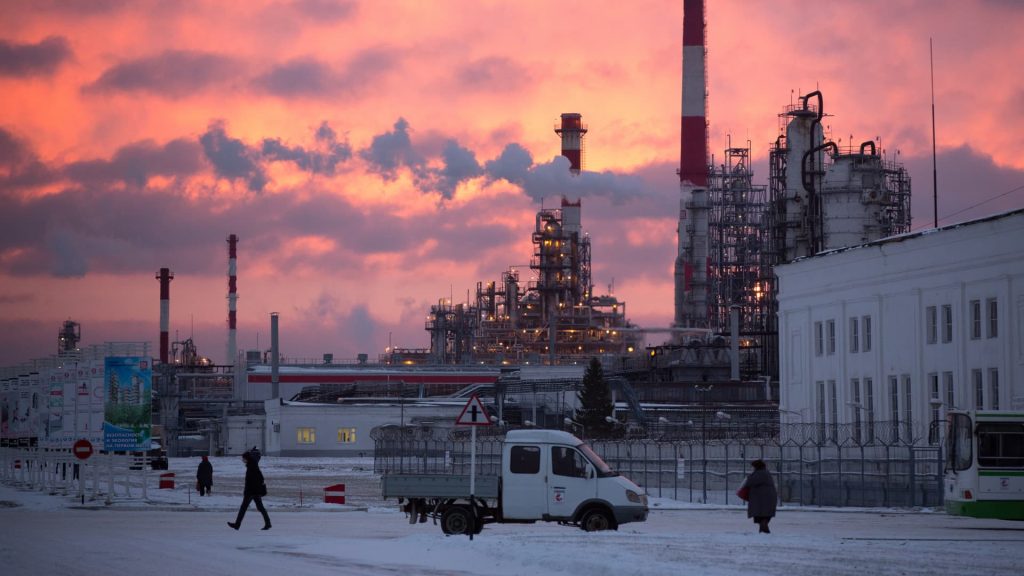
President Donald Trump could further rachet up sanctions against Russia’s oil sector, with an expected global surplus of crude next year leaving the U.S. room to escalate while insulating American drivers from a price shock.
The Treasury Department on Wednesday announced sanctions against Rosneft and Lukoil, Russia’s two largest oil exporters, citing Moscow’s “lack of serious commitment to a peace process to end the war in Ukraine.”
The sanctions mark the “most material move to date by the United States to shutter the Russian war ATM,” Helima Croft, head of global commodity strategy at RBC Capital markets, told clients.
The sanctions took the oil market by surprise. U.S. crude prices spiked nearly 6% to trade above $60 per barrel in response after many traders had discounted the risk of escalation due to Trump’s focus on keeping energy prices low.
Benchmark West Texas Intermediate U.S. crude oil prices hit five-month lows Monday and are down nearly 14% this year. The market has been under pressure as OPEC+ increases production and renewed trade tensions between the U.S. and China trigger fears of a global economic slowdown.
Weaker oil prices have given Trump scope to act against Russia while shielding U.S. motorists, said Bob McNally, president of Rapidan Energy and a former energy advisor to President George W. Bush. The White House likely saw this as an opportune moment to hit Moscow, with the U.S. midterm elections still a year away, Croft said.
“It’s about hurting the Russian finance ministry while protecting the U.S motorist,” McNally said.
Escalation on the horizon
Trump’s sanctions, which take full effect Nov. 21, are likely designed to force Russia to sell its oil at a steeper discount to global benchmark Brent rather than immediately targeting Moscow’s export volumes, McNally said. This would reduce Russia’s petroleum revenue while avoiding a price spike that pinches Americans’ pocketbooks, he said.
But the oil market faces a looming surplus in 2026 that would give Trump more leeway to escalate sanctions against Russia further next year, by directly targeting its export volumes, according to the former Bush advisor.
This would carry the added benefit of aiding U.S. shale oil producers who are under financial pressure from low prices, McNally said. U.S. shale executives have been deeply critical of Trump’s push to lower crude prices in anonymous responses to a quarterly survey conducted by the Federal Reserve Bank of Dallas.
“You can afford to do it because next year it won’t cause $100 oil — if anything it will help oil prices from dropping to $20 a barrel and killing shale,” McNally said.
“Next year somebody has to cut big – OPEC, Russia, Iran or shale,” he said. “Take your pick. The president doesn’t want shale to lose 2 million barrels a day plus like it did in 2020. He may want $40 oil but he doesn’t want $20 oil.”
Immediate market impact
The oil market may be close to pricing in the sanctions after the announcement caught traders by surprise, McNally said. Where prices go from here depends on how the measures are implemented. If the sanctions are loosely enforced, U.S. oil could dip back into the $50s but there’s also a risk that prices could push higher if the administration takes a hard line, the analyst said.
Lukoil and Rosneft account for more than half of Russia’s more than 5 million barrels per day in exports, according to data provided by Kpler. Trump’s sanctions come after former President Joe Biden in January sanctioned Russia’s third and fourth largest producers, Gazprom Neft and Surgutneftegaz.

India remained the largest buyer of Russia crude oil in September followed by China and Turkey, according to Kpler data. Trump has been pressuring India with tariffs to stop its imports of Russian crude.
“Refiners in India, China and Turkey are expected to conduct internal risk assessments on dealings with the sanctioned Russian firms while waiting for clarifications from their governments,” Matt Smith, an oil analyst at Kpler told clients in a note.
That could lead to oil being “being resold — at steep discounts — to refiners willing to take the risk, such as already-sanctioned entities” or small, independent, privately-owned refineries in China, Smith said. “However, a major disruption to Russian crude exports appears unlikely,” he said.

